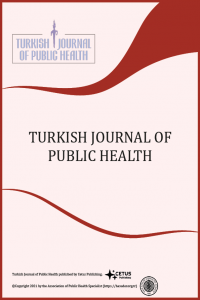Filistin Gazze’de Al-Azhar Üniversitesi öğrencilerinin HIV/AIDS’e yönelik bilgi ve tutumlarının değerlendirilmesi
Amaç: Bu çalışmada Gazze’de üniversite öğrencilerinin HIV/AIDS konusunda bilgi ve tutumları değerlendirilmiş ve cinsiyete, yaşanılan yere, sosyal ve ekonomik duruma göre HIV bilgi durumundaki farklılıklar tanımlanmıştır. Yöntem: Bu tanımlayıcı çalışmaya Gazze’de Al-Azhar Üniversitesin’den 492 öğrenci katılmıştır. Öğrenciler sosyodemografik özellikler, HIV/AIDS konusunda bilgi düzey ve tutumlarını içeren anketi kendileri doldurmuştur. Bulgular: Öğrencilerin HIV/AIDS’li bireylerle eşya paylaşımı konusunda algı düzeylerinin düşük olmasına karşılık, HIV/AIDS ile bilgileri orta düzeydedir. Çalışmaya katılanların yalnızca üçte biri HIV taşıyan bireylere dokunma ve iletişim kurmaya istekliydi. Öğrencilerin %50’den azı HIV/AIDS’li bireylerin toplumsal veya devlet işlerinde çalışma hakları olduğunu düşünmekteydi. HIV/AIDS taşıyan bireylere karşı damgalama ve ayrımcı tutumlar yüksekti. HIV taşıyan bireylerin çalışma hakkı olduğunu düşünen öğrencilerin oranı %48’di ve öğrencilerin %35.5’i HIV taşıyan bireylerle aynı ortamda çalışmayı istememekteydi. Sonuç: Bu çalışma öğrencilerin bilgi düzeylerinin iyileştirilmesi ile birlikte olumlu tutum geliştirmeleri için desteklenmeleri gerektiğinin göstermiştir.
A survey on the knowledge and attitudes among the students of Al-Azhar University to HIV/AIDS, the Gaza Strip-Palestine
Objective: The study assessed the knowledge and attitudes of students’ at a university in Gaza regarding HIV/AIDS and identified differences in knowledge about HIV, and attitudes by gender, locality, and social and economic status. Methods: This descriptive study targeted 492 students of Al-Azhar University-Gaza. The participants completed self-administered questionnaires that included the following dimensions: socio-demographic, measurements of student's knowledge level and measurement of student's attitudes towards HIV/AIDS. Results: Findings showed moderate level of knowledge regarding HIV/AIDS although there was a very low of perception regarding the acceptance and sharing of HIV/AIDS persons. It means that only one third of the study respondents are willingness to be in close touch with people living with HIV or even communication with them, and less than fifty percent thought that it is their right to be engaged in a public or governmental job, stigma and discriminatory attitudes toward HIV/AIDS persons is high only 48% of the students thought it right to employ people living with HIV (PLHIV) and 35.5% refused to work in the same place with PLHIV. Conclusion: This study indicates the need for improving the level of knowledge as well as promoting the students' towards positive attitude.
___
- Bhalla S, Chandwani H, Singh D et. Al. Knowledge about HIV/Aids among Senior Secondary School Students in Jamnagar, Gujarat. Health Popul Perspect Issues 2011;28(4):178-188.
- WHO, UNAIDS AND UNICEF. Progress Report. GLOBAL HIV/AIDS RESPONSE – Epidemic update and health sector progress towards Universal Access; 2011.20-10-2012
- http://www.who.int/en/
- State of Palestine, Ministry of health: Health annual report Palestine 2014: General directorate of planning& health policies. Palestinian health information centre 2015. www.moh.ps.
- UNFPA: Preventing HIV infection. Global Youth Partners. Advocating for increased access by young people to information, education and services in the area of HIV prevention:http://www.unfpa.org/hiv/g
- yp/. Accessed in 21/02/2013
- Xiaodong T, Jingju P, Dong Z, Chunhong W et. Al. HIV/AIDS Knowledge, Attitudes and Behaviors Assessment of Chinese. Int J Environ Res Public Health 2007; 4(3), 248-253.
- Palestinian Central Bureau of Statistics, 2001. Health Survey-2000. Final report. Ramallah-Palestine
- UNICEF. Knowledge, Attitudes and practices survey Healthy Lifestyles, United Nations Children’s Fund office in the Occupied Palestinian territory, 2011. 8. Husseini A, Abu-Rmeileh
- NME. and HIV/AIDS-Related
- Attitudes of Palestinian Women in the Occupied Palestinian Territory. Am J Health Behav 2007; 31(3):323-334
- Majdi MR, Khani H, Azadmarzabadi E. et. Al. Knowledge, attitudes and practices towards
- prisoners in Mazandaran province in the south-coast area of the Caspian Sea. Eastern Med Health J 2011;17(12):904- 910. among Iranian 10.
- Wong LP, Chin CK, Low WY, Jaafar N. HIV/AIDS-Related Knowledge among Malaysian Young Adults: Findings from a Nationwide Soc 2008;10(6):148. J Int AIDS 11.
- Mahat G, Scoloveno MA. HIV/AIDS knowledge, attitudes and beliefs among Nepalese adolescents. J Adv Nurs 2006; 53(5):583-590. 12.
- El-Sayyed N, Kabbash IA, El- Gueniedy M. Knowledge, attitude and practices of Egyptian industrial and tourist workers towards HIV/AIDS. Eastern Med Health J 2008;14(5):1126- 1135. http://www.mohe.ps/ Accessed date: 21/02/2013. 13.
- The United Republic of Tanzania- Ministry of Health - National AIDS Control Programme, 2003. HIV/AIDS/STI Surveillance Report Number 18. 14.
- Wong L, Caroline-Kwong LC, Wah- Yun L et al. HIV/AIDS-Related Knowledge among Malaysian Young Adults: Findings from a Nationwide Survey. J Int AIDS Soc 2008;10:148. 15.
- United Nations Programme on HIV/AIDS (UNAIDS): Key programmes to reduce stigma and discrimination and increase access to justice in national HIV responses.. 2012; guidance note. 16.
- Genberg BL, KawichaS I, Konda KA et.al. Assessing HIV/AIDS Stigma and Discrimination in Developing Countries. AIDS Behaviour 2008; 12:772–780.
- Başlangıç: 2003
- Yayıncı: Halk Sağlığı Uzmanları Derneği
Sayıdaki Diğer Makaleler
Gamze Varol Saraçoğlu, Burcu Tokuç, Sultan Doğan, Ülfiye Çelikkalp, Atilla Saraçoğlu
Lise öğrencileri arasında problemli internet kullanım alışkanlığı ve ilişkili faktörler
Rukuye AYLAZ, Gülsen GÜNEŞ, Yurdagül Günaydın, Mustafa KOCAER, Erkan PEHLİVAN
Van ilinde 0-12 aylık bebeği olan anneler bebeklerini nasıl besliyorlar?
Aktan TURAN, Ayşe YÜKSEL, Gülümser DOLGUN, İzzet ÇELEĞEN
Basil Kanoa, Osama AbuNada, Mazen El-Sakka, Moain Kariri, Adnan Al-Hindi
